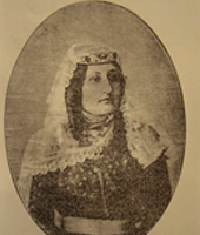
1880-1945
Aneta Gigibedashvili – Kapanadze was born into a family of a village writer in the Zemo Khandaki village in 1880. After graduating from a village school she continued her studies at the gymnasium in Gori though due to grave conditions in the family, she was unable to finish it. After the death of her parents, Aneta Gigibedashvili, at the age of 16, had no other option but to marry Ioseb Kapanadze, an administrative officer of Petre Gruzinski in the village of Akhalkalaki, Kaspi district.
Aneta Kapanadze actively cooperated with various newspapers and magazines (Nakaduli, Tanamedrove Azri, Temi, Teatri da Tskhovreba, Brdzola, Klde, et cetera). In 1902, she published her first book of poetry works.
Aneta Gigibedashvili – Kapanadze participated in the revolution of 1905. The Menshevik government arrested her several times.
Aneta Gigibedashvili – Kapanadze was a defender of women’s rights, an active member of the Society for the Spreading of Literacy Among Georgians. On her initiative, a school and a children’s library, also, a theater were established in the village of Akhalkalaki. She often participated herself in performances.
In 1911, Aneta Kapanadze was elected an honorary member of Georgia’s historical and ethnographic society. She collected historic and ethnographic items for this society and also worked on the issues of folklore. She collected works of folklore to further publish them in newspapers and magazines.
In 1921, Aneta Kapanadze was elected as a delegate of the first forum of non-party women.
How Earlier Women were Persecuted and are Still Persecuted Today
Author: Aneta Kapanadze
“Some nine or ten years ago, when a female defense lawyer appeared before the jury in a court of the Russian Empire, the court was closed on the premise that a female had no right to defend. In the Caucasus, on the jubilee of one poet, a woman, who was sent by peasants of various ethnicities to that event, was prohibited to approach the poet by the male intelligentsia of the ethnicity similar to that of the woman, because men viewed as offending the selection of a woman as a delegate. Railways denied women employment, saying women were good for nothing but flirting and coquetry.
“Of course, this destructive short-sightedness belongs to the past, but today when the axis of life has radically changed, a suppressed person was put next to a powerful, a peasant became equal to a noble, women feel the same zeal.
“It is very unfortunate that a new strong wind has yet failed to blow away the impression about women’s slavish nature, something which is deeply rooted in men. But the time will pass and men having come to their senses will bow their heads in front of women.
“Then a new person will welcome the new life, sing a new song of longevity and at the end of his life will rest in peace in the new grave with a beatific smile on his faces.”
The newspaper Voice of Georgian Women,
issue #9; 8 June, 1917

